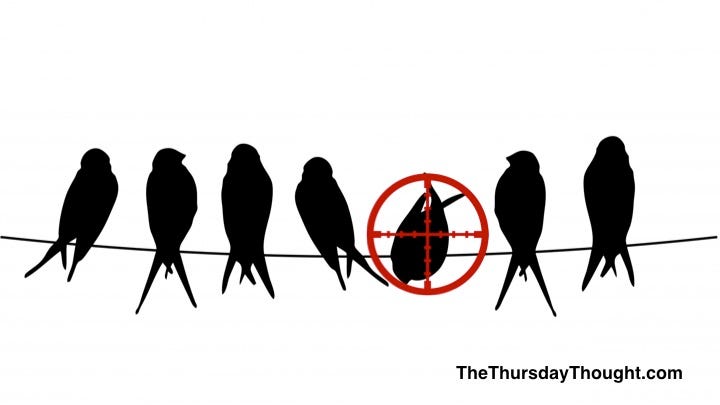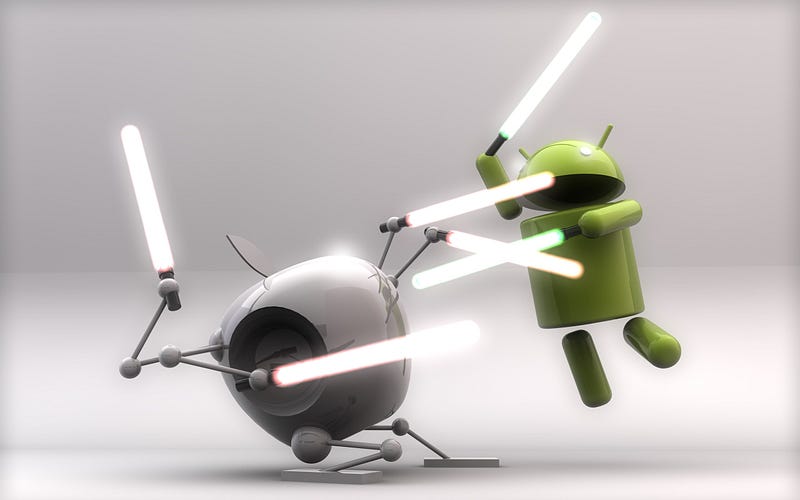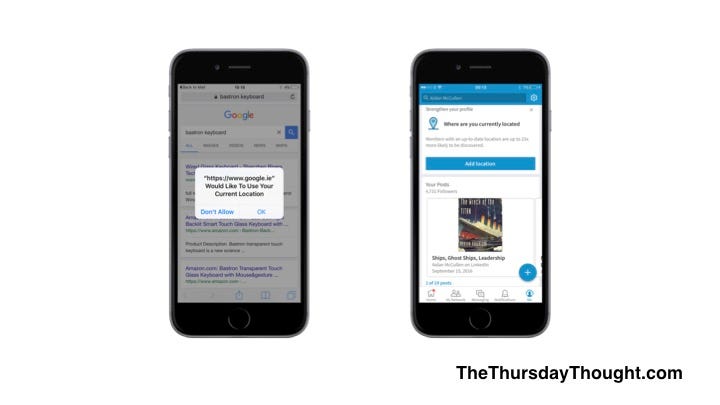
There are seven birds on a cable, I shoot one bird dead. How many are left?
There are a number of correct answers.
Yes, six is correct if the other birds don’t fly away because I use a silencer with my gun.
Yes, zero is correct if the other birds hear the gun and fly away.
The key to answering this question is that the context is understood by everyone when answering the question.
The future of so many aspects of our technological and digital world relies on a deep understanding of context. You could even argue that the future of the web is a web of context.
The Apple Maps Fail
“At Apple, we strive to make world-class products that deliver the best experience possible to our customers. With the launch of our new Maps last week, we fell short on this commitment. We are extremely sorry for the frustration this has caused our customers and we are doing everything we can to make Maps better.” — Tim Cook
This apology from Apple CEO Tim Cook came after a backlash in 2012. Apple had rushed the release of Apple Maps when iOS switched from using Google’s data to Apple’s own version of maps in iOS 6.
Google were pioneers in their early understanding that context will be the future of the web and indeed web advertising. Many others, including Apple and Uber used Google Maps as a way to build their products. Like, so many companies who use another’s platform to build, they eventually want to do this themselves, so that they are in charge of their own destiny.

Apple and Google used to be great frenemies. The story goes that Steve Jobs felt betrayed by Google’s Eric Schmidt, who used to be an Apple board member. Jobs felt Google invaded Apple’s smartphone territory with their Android interest. With that, revenge was vowed and Apple wanted to go to war on everything from Maps to advertising.
As a result Apple rushed their Maps release. Such apps require huge teams to literally map the world inch by inch. Google had started a long time before Apple. For Apple throwing money and people at it wouldn’t solve the issue alone. What Google have more than anything else is a huge head start, that is the real advantage, the gap is hard to close because Google have not stopped working on location.
Location, Location, Location

You have probably noticed you get asked for your location on devices much more than you used to. This is because your location data is very valuable. It is not so you can be tracked per se, but rather that the information you receive is relevant.
That information could be a search in Google (or Bing, or Facebook) or a relevant advertisement. In the examples above (left Google and right LinkedIn), Google want to know your location so the search is ultra relevant. So if I type in Chinese a search in Dublin in can make that search in context, am I looking for Chinese lessons, Chinese Food etc. When you add in my search history and indeed my Chrome history you can get a very accurate result indeed. This is what Google want to deliver, they want relevance for the user, because then they win versus competitors. As a novelty, once logged in, here you can see your entire location history: https://maps.google.com/locationhistory
As for LinkedIn, knowing my location means more relevant advertising and that I can be targeted by advertising by territory, plus my job title, my content consumed, by company size and company name. In my humble opinion, Microsoft buying Linkedin is not only a smart move for their suite of office products, but the contextual data held by LinkedIn could revitalise Bing — don’t write Bing off just yet. I expect it to rise like a search Phoenix from the ashes with a new proposition cleverly rebuilt for today’s web of context.
Uber Alles
“Accurate maps are at the heart of our service and backbone of our business” — UBER’s Brian McClendon
Uber, like Apple are also working on their own mapping product. Like Apple, they see the need to avoid an over reliance on Google Maps. In the Uber case, this is to protect their future which will be heavily dependent on maps and location. Think driverless car fleets, think uber deliveries and think smart cities. By owning their own mapping data Uber are much more in control.
In addition, Uber has slightly different mapping requirements than Google had catered for when they initially mapped the world.
Uber needs to know where is a good place to pick someone up in a certain location, is one route better than another, where congestion zones are most likely etc etc.
Context Fails
I always think of the days in the 80s/90s when you were sitting down for your dinner and you would get a call from a company rep looking for you to do a survey, which will only take 20 minutes.
I genuinely thought those days were over.
Then you get a call to your house at 7:30 pm. Your house is decorated in kids Halloween decorations, there are kids toys in your garden and a stray scooter out front, so it is clear you have young children. The doorbell rings while you are trying to put your 3 year old to sleep, you ignore it and then it rings again. Now your kid is awake and you bring him down with you to answer the door. The rep at the door is trying to persuade you to change energy provider. Despite all the signals informing him of your context he persists. You answer the door with a grumpy head, he sees you holding a baby in one hand and a extends his hand to introduce himself with a handshake. You look with disbelief as he continues. You politely decline and he insists. He says he might come back another time, you ask him not to. He seems perplexed, what did he do wrong?!?
Now think of a visit to a website, while you sit on public transport perhaps, you visit the site, you hear audio play loudly, you scramble to find it. You notice there is an ad that appeared half way down the page and you try to click the small x to close it. Your damn fat fingers mean you click the ad and you go through to a site selling books. You exit there and go back to where you wanted to be in the first place and now you are confronted with an ad retargeting you with the book that was on the landing page you landed on. The irony is you already bought this book!
These are common tales of zero context woe.
The opportunities to excel in context are immense, when the world becomes ultra connected we will have even more data to inform and contextualise. Before all this happens there are some blockers that need to be cleared such as siloed data across companies and industries, but it is a welcome future.
We will cover that in a future Thursday Thought.
On this weeks Innovation show we chat with Kieran Harte, MD of Uber Ireland and Northern Ireland. We talk about mapping, driverless cars and innovation. We talk with John Dennehy, CEO & Founder of Zartis and to Peter Fabor of Surf Office. Fergal O’Connor, CEO & Founder Happy Marketing and Media and startup buymedia.ie tells us about his world.
You can listen below or catch us on the following channels:
www.TheInnovationShow.io is a hub of all the shows, you drop me a mail on TheInnovationShow@gmail.com or via twitter @TheInnoShow
You can also subscribe on iTunes and find us on Soundcloud and Tunein.
We are also broadcast on RTÉ Radio 1 Extra every Saturday at 3pm and Tuesdays at 7am.